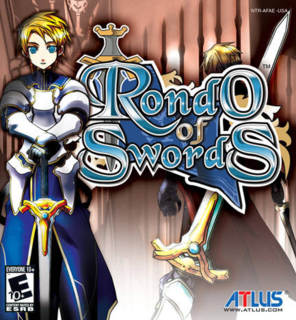Imperfect execution of a well-conceived concept
In many ways, despite bringing something significantly new to the table, Rondo of Swords feels quite old-school. You're set up with a very stereotypical plot, a couple minutes of dialogue, and then you're off on a quest to save the kingdom. Of course, there are plot points in between battles (a la Fire Emblem) but these are unoriginal and forgettable. Even the game's characters feel like they're taken from some sort of "SRPG unit template". But if you're playing Rondo of Swords for the story, you're here for the wrong reason.
What stands out with Rondo of Swords is how the game plays out. If you're sick of the typical turn-based strategy that has become so popular these days, you'll appreciate how this title operates. The turn-based mechanic is still there, but moving and attacking have been consolidated into one simpler action. Tap a character, draw out his or her path, and watch them go. If you happen to have directed them through enemy units, they'll attack on the way to their destination. Drawing routes through enemies is fresh and fun and a nice change of pace for those tired of Final Fantasy Tactics or Fire Emblem.
As a result of the game's unique core mechanic, the strategy of this title is going to be fundamentally different from that of your more typical SRPGs. What is considered a tactically sound move in say, Tactics Advance, may be a foolish strategy in Rondo of Swords. Naturally each character has a limited range of movement, so you've got to decide how best to put that range to use. Do you attack multiple foes and then leave yourself open to retaliation next turn, or sneak out, attack a foe, and then retreat to a safe position? The strategy is all about trade-offs and decision-making, and it's a lot of fun.
As an SRPG, Rondo of Swords leans more toward the "strategy" than the "role-playing". It's definitely a nice change of pace from the RPG-heavy titles like Tactics Ogre, Fire Emblem, and Final Fantasy Tactics Advance. There are no random encounters and no chance for level-grinding. Rather than using brute force to get yourself out the story's many tricky situations, you're going to have to take a smarter and more subtle approach.
Rather, the mission goals revolve not around routing the foe or defeating a boss unit. Instead, they usually direct you to a specific grid space -- incidentally, your path there is generally teeming with enemies. You'll have to make smart use of your units and your time; a lot of times sacrificing units is necessary and holding off a horde or foes with one character to allow the rest of the party to escape is not an uncommon tactical decision. Rondo of Swords is all about brains over brawns, and this hardcore strategy is much of what makes the title an enjoyable one.
I mentioned already the decision-making process that's such an important aspect to succeeding; unfortunately, this is where one of Rondo of Swords' biggest issues comes into play. The problem is that there's just no room for error. Making one wrong move causes a chain reaction and several turns down the road you may find yourself missing a key piece of your strategy to complete the mission. There's a real disconnect between this style of play and the vast openness of the mission maps; honestly, it's quite deceptive. Despite the fact that maps are huge and enemies are everywhere, much of that doesn't even come into play. Your mad dash for the finish and the carefully predetermined strategy that you must take are really all that matter.
To be sure, Rondo of Swords offers up a different kind of difficulty, and to be frank I'm not sure if it's one that I like. I have no problem with difficult games; the sense of accomplishment you'll feel after completing one is an unmatched sensation. But developers must also acknowledge the fact that there's a difference between "difficult" and just downright brutal. Sadly, Rondo of Swords falls under the latter header. If you use anything other than the "required" strategy to beat a level, you'll fail. Rondo of Swords is very much a frustrating game, to the point that it becomes almost tedious. You'll retry even early missions countless times. You'll want to step on your DS when you realize that you lost that last hour-long mission because of a single grid space when maneuvering a character.
But if you can get over this, you're going to find something to love with Rondo of Swords. The core gameplay mechanic works well, and the dev team has added a host of other negligible features to the game that are fairly typical to the SRPG genre (and are therefore, in the context of Rondo of Swords, not worth mentioning). If you come to grips with what you're getting in this package, you'll enjoy it. Rondo of Swords goes beyond difficult and ends up somewhere in the realm of "unfair". You'll have fun if you can overlook that, but that's a lot to ask of gamers just to be able to enjoy this title.

